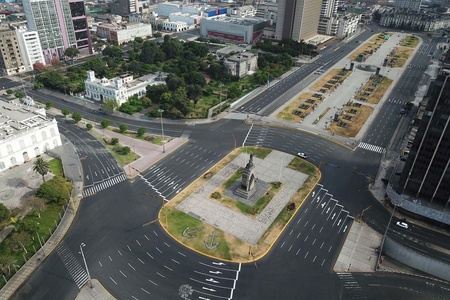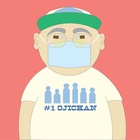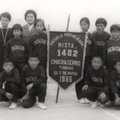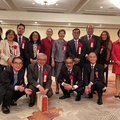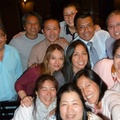In December, after almost nine months, I met up with several friends on two occasions, both in open spaces, outdoors (one of them in a park).
It was strange, especially because of the greetings, without hugs as is customary with dear and old friends, replaced by a shy pat on the shoulders, a fist bump or what is usual now, a slight tilt of the head from a distance, Japanese style. . At the La Unión Stadium Association, the sports institution of the Nikkei community in Peru, a banner warns members and visitors of a series of preventive rules against the coronavirus, one of which establishes the “salute to the Japanese.”
How the year has gone! When on Sunday, March 15, the president of Peru announced a 15-day quarantine to restrict the spread of the coronavirus, how naive were we to believe that the drastic measure would subdue or control it.
We were also naïve to believe the experts – including the Minister of Health – who told us that the virus would peak in April, after which it would begin its decline. The authorities extended the quarantine every two weeks, and still gullible, we hoped that each time would be the last.
The year is ending and although there is no longer a quarantine, the lives of many of us have barely changed, minimizing outings as much as possible (and always in open spaces). Not even Christmas will change that. Visiting a family member's house for lunch or dinner (which involves removing your mask), in a closed place (conducive to the spread of the virus), is reckless.
NIKKEI NETWORKS
In this spooky year, thanks to the networks built in the Nikkei community, as well as its institutions, things have been less difficult.
I remember how in the first months of confinement, an activity as simple as buying food was almost a high-risk operation and a task that could last for hours. The lines outside the supermarkets were very long and once inside you had to make purchases as quickly as possible so that more people could enter and reduce the risks of contagion.
In those days, it was common for some products to be in short supply (after two hours in line you would enter the supermarket and discover that, for example, there was no longer any chicken or bread) or for them to no longer accept food at an hour as early as 2 in the afternoon. more clients, so you went home empty-handed, as happened to me once.
Delivery services were our salvation. They prevented us from leaving the house and exposing ourselves to possible infection. However, with so much demand, the supply was not enough. It was common for them not to respond when you requested the delivery of food or cleaning supplies, for them to respond several days later, or for them to tell you that they could only fulfill your order within three weeks, a month...
I tried without success to use the delivery services of five or six companies or stores, until they notified me of the Okinawan Association of Peru (AOP). He was the first to respond and comply. I use it to this day.
Trust was and is a key factor. When masks or other essential products were not available in stores or pharmacies, the only alternative was online sales. But how do you know who to trust? Every time I found a seller, before contacting them, I would Google their name, company name, or phone number, and look for customer reviews, to make sure they were trustworthy and wouldn't scam me.
With the AOP I was saved from that obstacle, I could trust blindly. Furthermore, trust extended to service. I once placed an order with a large supermarket chain, trusting that they would be efficient. The operation was done online and the products arrived at my house on the agreed date. However, they were out of one of the items. They assured me that they would refund the amount. They didn't and I had to call repeatedly and send several emails to get my money back almost a month later. I never used their service again. I didn't trust anymore.
Quite the opposite with the AOP. The first or second time I used their service they forgot a carton of eggs. I didn't realize it until the next day. I did not complain because I thought that since I had not verified the items at the time of delivery, I had already lost my chance. I resigned myself.
However, one day, without me lifting a finger, they arrived at my house with the forgotten product. Righteousness and trust, I thought. Values that yield loyalty and reciprocity. On one side or the other—producers, sellers, distributors and consumers—we are part of a chain in which we all win.
The truth is, more than as the final link in a commercial operation, I feel like a member of a community where we all help each other.
Thanks to the valuable intangible capital of trust, the Nikkei community has come far, and its benefits emerge in difficult times like the current one.
That trust has allowed the emergence of networks in the Nikkei community that connect providers of products and services with consumers in a safe environment, where participants can sell or buy with the peace of mind of knowing that the other party will comply. Trust saves money, time and energy.
In a country with weak institutions like Peru, institutional strength in the community stands out as a dam against the crisis. If the AOP delivery service did not start from scratch, it was because it had the support of an institution, which allowed it to be organized quickly.
The fact of having strong institutions facilitated, to cite another example, the collection and delivery of aid to the Emmanuel nursing home, which houses the elderly in the community and where the virus also wreaked havoc.
The aid campaign for the most vulnerable sectors, Peru Ganbare, promoted by the Peruvian Japanese Association (APJ), was possible thanks to the strength of an institution more than one hundred years old that survived a war and its closure, ordered by the Peruvian government, a US ally, in the 1940s.
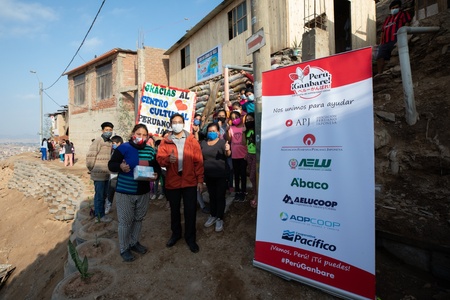
While the pandemic has disrupted our lives, they somehow have to continue. They live off food, but also on culture, and the APJ has organized events such as the Nikkei Young Art Salon, which brings together young artists of Japanese ancestry, or the Peru Kohaku Uta Gassen, which was broadcast live with the participation of musicians in Peru and Japan.
On the other hand, the APJ held a virtual mass in memory of community members who died during the pandemic.
When one reviews the history of Japanese immigration to Peru, it is striking how quickly and effectively the Japanese organized themselves and founded institutions that served as social, economic and moral support for the members of the colony. More than 120 years after the arrival of the first Issei to the country, the networks that our ancestors wove continue to sustain us and acquire particular relevance in these times of crisis.
In normal times we do not pay much attention to their presence, but when plagues like the current one break out, then we realize how much we need them and we thank our grandparents and parents for having created institutions 50, 100, 110 years ago, which help us to this day.
RESIST, A LITTLE MORE
A few months ago I read that in a European country that had gone through the first wave of coronavirus without major shocks (the second one is devastating) there were people who did not believe in the virus because very few of its inhabitants (around 11 percent) knew people who had been infected. I was surprised by the great contrast with Peru, one of the countries hardest hit by the pandemic. I don't think there is anyone here who doesn't know a person who died from covid-19 (relative, friend or acquaintance).
The loneliness of farewells, the impossibility of accompanying the bereaved and, in the case of the Nikkei community, of collaborating with expenses through envelopes make the situation more painful (although, luckily, initiatives are emerging to maintain this deep-rooted practice).
In short, all that remains is to continue taking care of ourselves and resisting. We all want 2020 to be over now. Yes, we know that the virus, just as it does not distinguish borders, ethnicities or cultures, nor does it pay attention to human conventions on the division of time. It doesn't matter to you on January 31st or on January 1st. From one day to the next—even if this belongs to the next year—it is not going to weaken or become less contagious.
However, the beginning of a new year generates a positive psychological effect, it recharges us, as if we were starting over, as if we were still whole (even if the body is damaged). We must take advantage of the clean and jerk (which will inexorably dilute over time) to boost our spirits and store enough energy until the vaccine arrives. It has been a horrible year, but at least we say goodbye with the certainty that the nightmare will end in the medium term. To keep hope.
© 2020 Enrique Higa Sakuda


